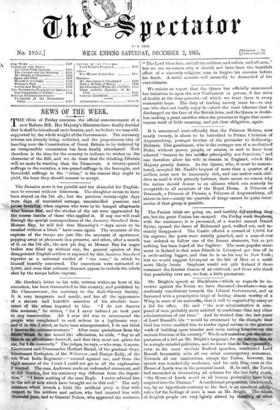Mr. Gordon's letter to his wife, written within an hour
of his execution, has been transmitted to this country, and published by Mr. Chamerovzow, the secretary to the Anti-Slavery Society. It ia very temperate and manly, and has all the appearance of a sincere and heartfelt assertion of his absolute inno- cence of the crime imputed to him. "I do not deserve this sentence," he writes, "for I never induced ,or took part in any insurrection. All I ever did was to recommend the people who complained to seek redress in a legitimate way ; and if in this I erred, or have been misrepresented, I do not think I deserve the extreme sentence." After some quotations from the Bible; which do not sound like affectation, he adds, "Say to all friends an affectionate farewell, and that they must not grieve for me, for I die innocently." The judges, he says,—who were, it seems, Lieutenant and Commander Herbert Brand, of the gunboat Onyx, Lieutenant Enington, of the Wolverene, and Ensign Kelly, of the 4th West India Regiment—" seemed against me, and *from the rigid manner of the Court I could not get in all the explanation I wanted. The man Anderson made an unfounded 'statement, and so did Gordon, but his testimony was different from the deposi- tion." "I knew nothing of the man Bogle. I never advised him to the act or acts which have brought me to this end." The only sentence which sounds a little like artificial piety is that with respect to the soldiers and sailors, who had taunted him with shameful jeers, and to General Nelson, who approved the sentence,
"The Lord bless him, and all the soldiers, and sailors, and all men," but we see no reason why it should not have been the heartfelt effort of a sincerely religious man to forgive his enemies before his death. A strict account will assuredly be demanded of his executioners.


































